Search the Special Collections and Archives Portal
Search Results
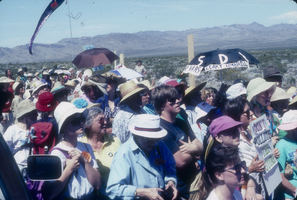
Slide of protesters at a demonstration held on Mother's Day near the Nevada Test Site, May 10, 1987
Date
1987-05-10
Archival Collection
Description
Color image of a crowd of protesters at a demonstration held by American Peace Test, a group opposed to nuclear testing.
Image
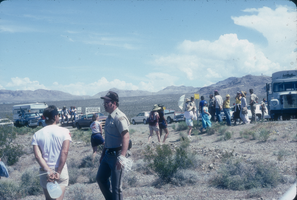
Slide of a protester being arrested at a demonstration near the Nevada Test Site, May 10, 1987
Date
1987-05-10
Archival Collection
Description
Color image of a protester being arrested at a demonstration held on Mother's Day in 1987 by American Peace Test, a group opposing nuclear testing.
Image
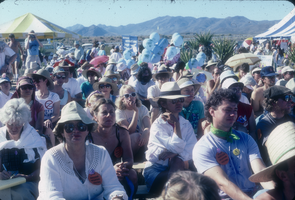
Slide of protesters at a demonstration held on Mother's Day near the Nevada Test Site, May 10, 1987
Date
1987-05-10
Archival Collection
Description
Color image of a crowd of protesters at a demonstration held by American Peace Test, a group opposed to nuclear testing.
Image

Slide of women with balloons at a demonstration near the Nevada Test Site, May 10, 1987
Date
1987-05-10
Archival Collection
Description
Color image of women with a sign reading "Pay women not the Pentagon" and many blue balloons designed to look like the earth. This was at a demonstration held on Mother's Day in 1987 by American Peace Test, a group protesting nuclear testing.
Image
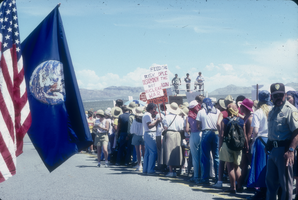
Slide of protesters with signs and flags at a demonstration near the Nevada Test Site, May 10, 1987
Date
1987-05-10
Archival Collection
Description
Color image of a crowd of protesters at a demonstration held by American Peace Test, a group opposed to nuclear testing. This protest was held on Mother's Day in 1987. An American flag and a flag with the Earth on it are visible in the foreground.
Image
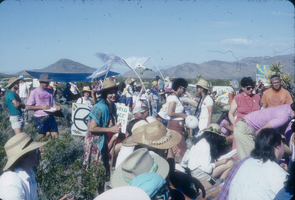
Slide of people at an American Peace Test protest near the Nevada Test Site, May 10, 1987
Date
1987-05-10
Archival Collection
Description
Color image of a crowd of protesters at a demonstration held by American Peace Test, a group opposed to nuclear testing. This protest was held on Mother's Day in 1987.
Image
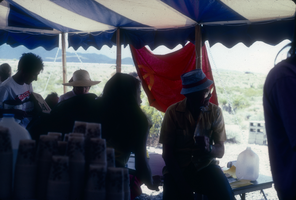
Slide of people at an American Peace Test protest near the Nevada Test Site, May 10, 1987
Date
1987-05-10
Archival Collection
Description
Color image of protesters at a demonstration held by American Peace Test, a group opposed to nuclear testing, on Mother's Day in 1987.
Image

Slide of a wall of protest drawings at a demonstration near the Nevada Test Site, May 10, 1987
Date
1987-05-10
Archival Collection
Description
Color image of a wall of protest drawings at a demonstration held on Mother's Day in 1987 by American Peace Test, a group opposing nuclear testing.
Image

Slide of a statue and protest signs at a demonstration near the Nevada Test Site on Mother's Day, May 10, 1987
Date
1987-05-10
Archival Collection
Description
Color image of a statue of a nude, pregnant woman and a protest sign reading, "Stop nuclear weapons testing," at a demonstration held by American Peace Test, a group opposed to nuclear testing.
Image
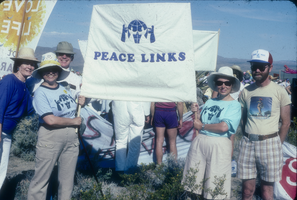
Slide of protesters with a banner at a demonstration held near the Nevada Test Site on Mother's Day, May 10, 1987
Date
1987-05-10
Archival Collection
Description
Color image of protesters holding a banner reading, "Peace Links," at a demonstration held by American Peace Test, a group opposed to nuclear testing.
Image
Pagination
Refine my results
Content Type
Creator or Contributor
Subject
Archival Collection
Digital Project
Resource Type
Year
Material Type
Place
Language
Records Classification
